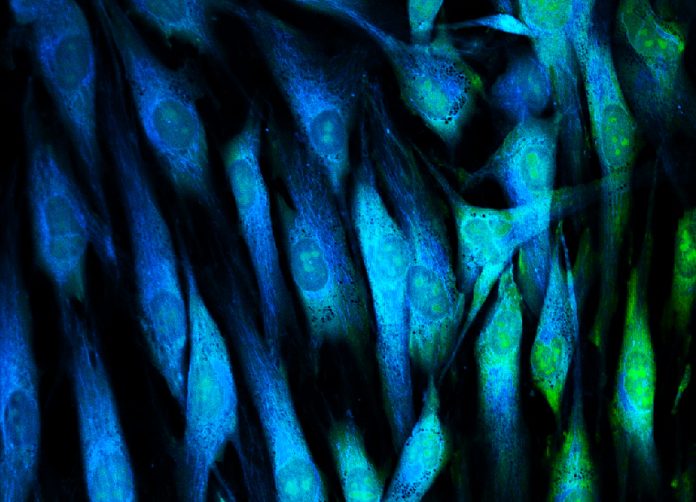
A new mouse study by researchers at the Perelman School of Medicine at the University of Pennsylvania demonstrates that a stress protein, ATF4, found to play a supportive role in fibroblasts, may be a potential target for future cancer therapies.
The findings appear in Nature Cell Biology in a paper titled, “A stromal integrated stress response activates perivascular cancer-associated fibroblasts to drive angiogenesis and tumor progression.”
“Bidirectional signaling between the tumor and stroma shapes tumor aggressiveness and metastasis,” wrote the researchers. “ATF4 is a major effector of the integrated stress response, a homeostatic mechanism that couples cell growth and survival to bioenergetic demands. Using conditional knockout ATF4 mice, we show that global, or fibroblast-specific loss of host ATF4, results in deficient vascularization and a pronounced growth delay of syngeneic melanoma and pancreatic tumors.”
The researchers discovered in mouse models of pancreatic cancer and melanoma that the stress protein, known as ATF4, enables fibroblasts to support tumor growth by promoting the formation of tumor-serving blood vessels. Deleting ATF4 in fibroblasts severely impaired new tumor-supportive vessel formation as well as tumor growth, without causing significant harm to the mice.
“Our results suggest that inhibiting ATF4 could work against many types of cancer, and we’re now actively pursuing that strategy,” said study senior author Constantinos Koumenis, PhD, the Richard H. Chamberlain professor of research oncology in the department of radiation oncology at Penn. “Every tumor we’ve looked at upregulates ATF4.”
ATF4 is produced in cells as part of a broad response to stresses such as oxygen or nutrient deprivation.
The researchers engineered mice whose ATF4 gene could be deleted body-wide at any time. They found that if they deleted ATF4 before or even after tumors began growing in the mice, the growth of the tumors and their ability to spread to distant organs were greatly impaired. The scientists then used single-cell RNA sequencing to examine the impact of ATF4 deletion in all the cell types within the tumor. They observed a large effect on a population of tumor-supporting cells called cancer-associated fibroblasts (CAFs).
When the scientists deleted ATF4 only in fibroblasts, they saw a tumor-slowing effect almost as strong as that observed with full-body ATF4 deletion.
“These findings indicate that ATF4’s support for tumors is mediated to a great extent by CAFs,” Verginadis said.
“On the whole, ATF4 appears to be an attractive cancer target,” Koumenis said. “A drug that inhibits it would block its pro-tumor effect not only in tumor cells but also in cancer-associated fibroblasts, so it should be a double-whammy for the tumor. But we’re still a few years away from that.”
The findings establish stromal ATF4 as a key driver of CAF functionality, malignant progression, and metastasis
Koumenis’s lab is now working to develop inhibitors of ATF4 that could be tested in further animal studies and ultimately in human cancer patients.











